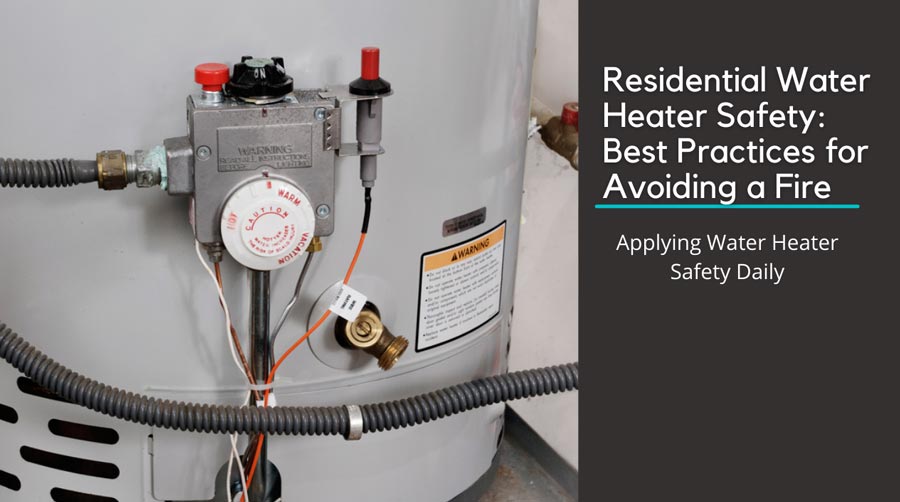
Residential Water Heater Safety: Best Practices for Avoiding a Fire
In this article, we’re talking about water heater safety. You know, that big ol’ cylinder in your garage, or in some cases outside your house in its own little enclosure. It performs its job day in and day out, without complaint, heating your water so that you may enjoy that hot morning shower and those sparkling clean dishes. You likely seldom think about your hot water heater, but you ought to, and below I’ll lay out a few reasons why.
According to the National Fire Protection Association, on average there are 5,400 home fires a year, resulting in about 20 fatalities from water heaters.
Having inspected thousands of homes for banks, Management One, and insurance companies, I can tell you this is for real. Most of my information comes from years of insurance work. Gathering data on houses for nearly every insurance company, I learned that that are a good many things which can cause claims, losses, be it due to injuries, property losses, and deaths. Water heater safety is sort of a no-brainer, except that most people almost completely ignore their water heater.
Applying Water Heater Safety Daily
I have taken to applying, as needed, this learned information to my property inspections for Management One, as we don’t want to have an owner or a resident suffer any of the above either. Simply put, an ounce of prevention can mean the difference between life and death, whether it be a home you own and live in or a rental.
Interestingly, insurance companies are inconsistent. Only one company consistently asked for water heater information, that being USAA. The rest, I suppose, view 5,400 fires and 20 deaths as an acceptable risk. We do not.
Can the items in this water heater safety article be applied to other things?
Yes, you can apply the same principles I will give you below to both gas and electric water heaters, as well as furnaces. Heck, you can apply it to stoves and fireplaces as well. If we’re talking about a heat generating appliance or fixture, never forget that it can kill you.
Water heaters utilize a whole lot of heat
A BTU is a British thermal unit. It takes 8.33 BTUs to raise the temperature of 1 gallon of water 1 degree Fahrenheit. Raising a 40-gallon water heater by 10 degrees, say, after someone has showered, requires 3332 BTUs. A cubic foot of natural gas contains 1028 BTUs, so we’re talking about more than 3 cubic feet of natural gas being burned in a very short period of time. Have you ever boiled water on the stove? Takes forever, right? All that heat, all those BTUs. A water heater uses a lot more.
What’s the danger and what do I do?
First, gas. A gas water heater can leak gas, through the fittings, even though the control module. Gas leaks, water heater burner ignites, boom. If you smell gas, call the gas company immediately. This goes for any natural gas appliance in or out of the house.
Second, combustion. Anything combustible within 36″ of a water heater must be moved out of that range. Paper, bags, clothing, etc. If it can burn, it will burn in the right circumstances. It’s not that these items will spontaneously catch fire, but they can. The gas burps out then ignites wrong, you will have a fire.
We haven’t even addressed flammable items, such as gasoline. Do you know why water heaters sit raised on pedestals? Because gasoline fumes tend to stay low to the ground. Cars are fueled by gasoline. Lawnmowers are usually fueled by gasoline, and there’s often a gas can in the garage if there’s a mower stored there. Get the flammables out, and no matter, keep them as far from the heat source as possible! And…
- Always keep the fire chamber cover ON the unit. Always. This contains errant flames.
- ALWAYS have a qualified contractor, such as a licensed plumber, install your water heater!
Oh, and often times I find the furnace mounted right next to the water heater. One line, two appliances. However, be sure to follow the same 36-inch rule! Sometimes people will measure the distance and put tape on the ground to mark the safe distance to keep clear from the heat source.
What about electric water heaters?
Remember the 3332 BTUs I mentioned above to heat a 40-gallon water heater full by 10 degrees? 3332 BTUs is equivalent to nearly a kilowatt-hour of electricity. That is a lot of heat as well. Just always keep anything that can burn 36″ away from any heat source. This includes your stove, oven, fireplace, space heaters, wood-burning stoves, furnace, etc.
There is more to it than just water heater safety
If you live in a house and have a tank water heater, as opposed to tank-less, it is also a good idea to occasionally inspect it, top to bottom. Look for any signs of water leakage, smell of gas. Test your pressure relief valve (the is the little doo-dad with a toggle test valve in it). This is designed to keep your water heater from exploding.
That click and pop sound you may at times hear from your water heater? That is basically the sound of minerals and sediment exploding inside. Sediment enters in tiny parts per million with the incoming water but does not typically drain out when you call for hot water. With that sediment inside two things are happening.
- The sediment balls up and creates hot spots inside, on the tank walls. It usually pops when heating, but those hot spots where the balls were attached cause accelerated corrosion.
- When you’re heating water, you first must heat that sediment, the sediment then heats the water. This is not efficient and causes you to have higher energy bills.
The fix for this is to drain the water heater either yearly, or twice yearly. You simply attach a garden hose to the faucet at the bottom of the water heater (yes, it will fit) and open the faucet valve. You’ll note the water looks cloudy and smells weird, that is okay. What you are seeing and smelling is sediment-filled water from the bottom of the tank. When the cloudiness and smell disappear, stop draining the tank, detach the hose, and make sure that the faucet is not dribbling. It happens sometimes. If it is dribbling, have a plumber out to replace the faucet. By doing this maintenance, you will extend the life of the water heater by years and perhaps avoid a water heater leak and the delayed cost of replacement significantly.
Last words on water heater safety
Do be sure your water heater has two earthquake straps holding it in place, even if you are not in earthquake country. It’s never too much to be certain.
Keeping you and your family safe is the number one goal. Now, go check your water heater!











